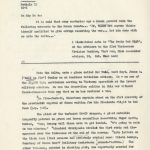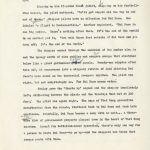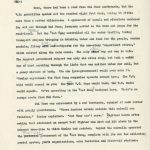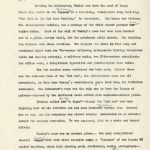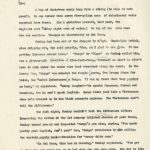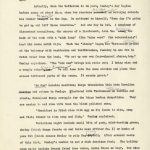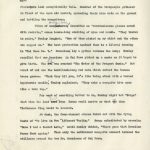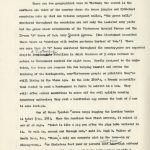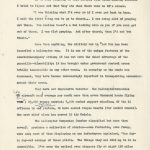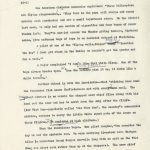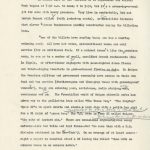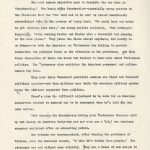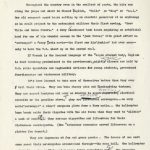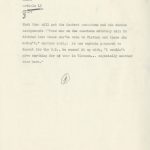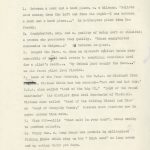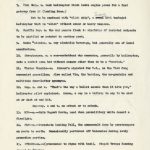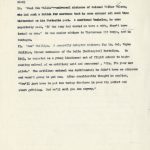1964, “Nowhereville”
deepe
mister americaDI precede Not used
Mister America in “Nowhereville”
(Of all the military creatures ever invented, the one called “the advisor” is perhaps the motst ambiguous. American GIs here openly pray he becomes obsolete.
To American GIs, advisorship is the privilege to advise without the guarantee of consent; the privilege of being a friend without the prerogative of being an ally; the right to die without the privilege of issuing a command; the privilege of being shot at without the right of shooting first; the right to fight with the Vietnamese without the privilege of fighting against the Viet Cong Communists; the privilege of being blamed for losing the military war without the right of winning it; the right to be assigned to a political war without the privilege of learning politics.
It is the right to die with honor without the honor of being thanked, the right to be forgotten without the privilege of forgetting.)
(More)
Beverly Deepe
101 Cong Ly “Nowheresville”
Saigon
__________
Article 15
SI-I
Pa–ddy Ra–ts:
It is said that many centuries ago a Roman general made the following comments to the Roman Senate… “If, there aretherefore, anyone thinks himself qualified to give advice resecting the war… let him come with me unto the delta…”
A black-inked note in “The Paddy Rat Club”, of the advisors to the 21st Vietnamese Division BacLieu, Viet Nam, from ex-senior advisor, Lt, Col. Reed Ladd
66___________________________________________________________________________
Unto the delta, unto a place called Cai NuleNube went Capt. James A. (“call me Jim”) Conley as an American Battalion advisor. He w as one of the 19,500 U.S. servicemen serving in Vietnam; operationing at the lowest military echelon. He was the front-line soldier in this war without front-lines–in this war that no one has declared a war.
The five-foot-II, Ohio-born captain stood on the dirt airstrip of the provincial capital of Camau waiting for his 21-minute flight to Cai Nuoc (pop. 500).
The pilot of the turbojet UH-IB chopper, a giant metallic dragonfly painted in green and brown camouflage resembling tiger spots, barked, “Hey, Sargem, tell those cats to get loaded. It’s going to rain in ten minutes.” Whimsical whirlpools circled the dirt strip and dis-appeared over two tinhouses at the end of the runway. White letters on the black door (that someone had peniouslypreviously stolen) read: Pilots Lounge, Courtesy of Camau Mac-V (military Assistance Command-VietNam.) The other tinhouse , painted in shocking pink, was reportedly erected for women passengers. It was not used very often.
DEEPE
article 15
SGI-2
Zipping up his 17-pound flack jacket, shlipping on his football-like helmet, the pilot muttered, “We’ll get zapped all the way in and out of there.” Chopper pilots have no affection for Cai Nuoc. One labeled it “a flight to Nowheresville.” Another explained, “Cai Nuoc is one big period. There’s nothing after that. It’s the end of the world.” Or as another put it, “You walk three feet outside of Cai Nuoc and you drop off. It’s the end of the world.”
The chopper wormed through the sandwich of the somber clouds and the spongy earth of rice paddies and mangrove swamps that stretched below like a giant galvanized jignawjigsaw puzzle. Twenty-one minutes after take off, it maneuvered into a slippery stretch of land skirting Cai Nuoc‘s main canal as the torrential downpour arrived. The pilot was right, but not surprisingly so. For Cai Nuoc means “water.“
Conley gave the “thumbs up” signal and the chopper immediately left, sligthering between the clouds and the treetops that met at 100 feet. The pilot was again right. The zaps of Viet Cong groundfire reverberated from the clouds, fluttered back to Cai Nuoc and then into emptiness. Painfully, Cai Nuoc became a camp with no exit… a three-aereacre blob of governement property down in the heart of Viet Cong country. Except for battalion-sized operations, there’s only one way for a person to leave Cai Nuoc–to go up–and the choppers had taken that escape route with them.
DEEPE
article 15
SGI-3
Once, there had been a road from Cai Nuoc northwards, but the V.C. guerrillas spaded out the roadbed eight feet deep, making it little more than a rutted wilderness. A spiderweb of canals and riverlets wandered in, out and through Cai Nuoc, (sampans served as the cars and jeeps for the road-less tours). But the Viet Cong controlled all the water traffic, taxing transport sampans bringing in drinking water and food for the people, wooden sandals, flimsy sildsilk and|toothpastse for the one-story “department stores,” which existed along the main canal. The only okkerother way out was to walk. The nearest government outpost was only six miles away, but took a solid day of hard marching through the limbo that was neither water nor soil, but a gooey mixture of both. “No one (pro-government) would ever make it “Conley explained: “ Two Viet Cong companies operate around here. The V.C. kids would squeal on you; the Viet V.C. dogs would bark; the V.C. ducks would squalk. We’re operating int he Viet Cong‘s backyard here. There’s no escape route from Cai Nuoc.”
Cai Nuoc was surrounded by a mud barricade, squared at each corner with gangly guardtowers . “Three hundred meters outside this mudwall are foxholes,” Conley explained. “And they ain’t ours.” Eighteen hours after making that statement an escort T-28 fighter was shot and hit above in the coconut tree-line to which Conley had pointed. Beyond the mudwalls operated the prwincialProvincial government of the Viet Cong, complete with its own tax collectors, postal system, youth organizations, arms factories and first-aid stations.
DEEPE
article 15
SGI-4
Leaving the helicopter, Conley ran down the road of bumpy baked clay knobs to the balconyBalcony of a low-slung, twenty-foot long building. “And this is the Cai Nuoc Carlton,” he announced. His humor was obvious. The cremecolored building was a montage of the white cement patches forover bullet holes. Most of the wall of Conley‘s room had once been knocked out by a .57mm. mortar shell, but the patchmark still showed. The building was divided into three sections. The largest was about 19 feet long and contained eight beds for Vietnamese officers, orangecrate holding transistor radio and shaving material, a military radio, two 18th-century schooldesks for office work, a dilapidated typewriter and picnic-styled mess table.
The two smaller rooms contained two beds each. Behind these was the darkened room of the “old man”, the affectionate name for all commanders, in this case Conley‘s counterpart, capt. Danh Deng, the battalion commander. The commander’s room was the only one to have the luxury of privacy–imposed by two shuttered doors dabbed with mucshroom-colored paint.
(Conley called himDeng “a tiger”–though the “old man” had been fighting half of his lifetime and had seen hundreds of his troops die. Several yea rs ago, one his companies was almost totally annhilated in an ambush–except the company commander. He was captured, tied to a stake and burned alive).
Conley‘s room was an austere place… two army cots (without sheets) droppeddraped with drab olive mosquite nots ; a “dresser” of two boards ma nailed together, which held shaving geat , stationary, radio, photographs–almost everything but clothes which were stashed away under the cot. A bag
DEEPE
article 15
SGI-5
A bag of c hristmas candy hung from a string (to make it rat-proof). In one corner were seven five-gallon cans of chlorinated water imported from Camau. (As a christmas present, last year, the Regiment sent Conley eight cans of water.) On top of the cans were two red candles. There’s no electricity in Cai Nuoc.
Conley had been met at the chopper by M/Sgt. Theedulphe Arbiol, also dripping wet, who said quietly, “Man, am I glad to see gyou. It was getting lonesome around here.” “Sarge” or “Tiger” as Conley called him, was a 35-year-old Hawaiian of five-foot-four, interestinches so short he didn’t have to duck under the commo wire that stretched along the canal. In the Koreuan War, “Sarge” was sawarded two Purple Hearts, Two Bronze Stars for valor, the Combat Infantryman‘s Badge. “I was up front when they pooshed us back,” he explained. Conley laughed–“He speaks Japanese, Korean and Hawaiian, but he can’t speak English. Sarge looks just like a Vietnamese when he’s dressed up in his black peasants pajamas. The Vietnamese can’t tell the difference.”
One dark night, Conley couldn’t tell the difference either. Inspecting the rifles of the 1st company billetedunder shadows of palm trees, Conley turned around and inspected “Sarge‘s” gun also, saying, “You speak pretty good English, don’t you?” Now, “Sarge” retaliates by cla calling the captain pupule haole–Hawaiian for “crazy white man.”
“In Cai Nuoc, time has no meaning,” Conley explained. “You get up when the sun comes up; go to bed when the sun goes down. One day is like another; we have ambushes on holidays like any other day.”
DEEPE
article 15
SGI-6
Actually, when the battalion is in post, Conley‘s day begins before sunup at about 4|a.m. when two roosters perechedPERCHED on a waterjug outside his window trumpedtrumpet in the day. He muttered to himself, “Some day I’m going to get up and biff those roosters.” And one day he did. A symphony of discordant mosquitoes, the snores of a lieutenant, down the aineyBalconey, the hack of the cook with a “sick lung” (the “nice word” for tuberculosis“) kept him awake until 6:30. Then the “lineup” began. tThe Vietnamese officials gather at the balconey with washbasins and toothbrushes, running to and fro to fetch water from the back. “We set up our own four-channel stereo, too.,” Conley explained. “The ‘old man’ brings his radio out; I bring mine and a couple others, too.bring theirs. We all tune into the same station and place them around different parts of the house. It sounds great.”
“An Com” heralds mealtime; Sarge translates this into Hawaiian kau-kau and relays to Conley. Clustered with Vietnamese officers on benches and stools, Conley|and Sarge scrapple for the biege chopsticks. They are easier to eat rice with than the polished black ones.
“Breakfast is fried rice with egg on it; lunch is rice, soup and fish; dinner is rice soup and fish,” Conley explained.
Variations might include small bits of pork, mint-tasting grass, shrimp (which Sarge feasts on and tells mess officer No. I) or hunks of pure fat (which causes Conley to yelp No. 10,000). After several weeks of this diet, Conley‘s unable to eat a rich American food. The holiday menu might include french fried tree worms, ducks blood or beef. Per diam mess bill is thirty piastres (about forty cents.)
DEEPE
article 15
SGI-7
The working hours in garrison are unregimented , varying with reports to higher headquarters ( the “head shed”) , planning of training shedules or operations, checking equipment, ordering supplies and ammo, training sessions with the mortar company, or discussing future projects with Capt. Deng over a cold beer in the “corner drugstore.”
During off-duty hours, time flits by answering letters (letters sometimes fresdropped by airplane into Cai Nuoc inevitably land in canals. Did you ever read a wet letter? Conley gueried .) Or reading by candlelight inside mosquito net (Conley majored in philosophy at Bowling Green State Uni. in Ohio; he was reading Will Durant). Or playing Chinese poker or coup (a French game similar to gin rummy. “Sarge” usually wins by practicing what the Vietnamese call “Oahy psychology”–holdingthe best cards but laying them down last.) For evening strolls across the canal, Sarge and Conley dress in the black pajama-like ba-bas of the rice paddy peasants and their shower shoes, which they call “Jesus slippers” or “coolie clods.” Inevitably cherub-faced children of the town tag along shouting “Ong My; “Ong My, which means Mr. America.
For special occasions Conley wears violent turquoise ba-bas. One of these events was the night the first movie was even shown by in Cai Nuoc, it was brought in by a Vietnamese team for civioccivic action and psychological war and advised by Capt. John Barner, a tall North Carolinea Negro who’s described as “a prince” by other Americans. The movies, included a Vietnamese war documentary, a USIS documentary about Nepal but spoken in Vietnamese and Bing Crosby via “skinny vision”–that particuliaritypeculiarity of projecting cinemascope film through a regular lens, which makes all
DEEPE
article 15
SGI-8
characters look exceptionally tall. Hundred of the townpeople gathered in front of the open air market, spreading their rice mats on the ground and battling the mosquitoes.
Bites of mesquiteresmosquitoes, described as “reconnaisance planes armeed with rockets,” cause hours-long swelling of eyes and mouth. “They travel in pairs,” Conley laughed. “One of them picked up my shirt and the other one zapped me.” The best protection against them is a liberal dousing in “Cai Nuoc No. 7.” Occasiona lly a python invades the camp; Conley recalled that one American in Cai Nuoc picked up a snake as it began to give birth. The 2IiGI was awarded “The Order of the Pregnant Snake.” But worst of all are the half-inch-long red ants which infest the banana tree groves. “Wheh they hit you, it’s like being stuck with a burred hypodermic needle,” Conley explained. “They make a mosquito bite seem like a love tap.”
For want of something better to do, Conley might bet “SArge” what time the last beatBoat from Camau would arrive or what the time the Vietnamese flag would be lowered.
At dusk, the four-channel stereo faded out with the dying beats of “We live in Two Different Worlds.” Sarge substituted by crooning “Once I had a Secret Love,” until conley chided, “There goes that Hawaiian Perry Comeo again.” Then only the subliminal mosquito concert invaded the stillness around the two Mr. Americans of Cai Nuoc.
DEEPE
article 15
SGI-9
There are two geographical wars in Vietnam; the second is the notrthern one third of the country where the dense jungles and 2500-foot mountains make up what one veteran sergeant called, “the green hell.” Scattered throughout the mountains are not only the isolated army posts but the grass shack detachments of the Vietnamese Special Forces and the I2-man “A” teams of U.S. Army Special Forces. (One lieutenant described these teams as “marriage with twelve partners instead of two.”) There are more than 40 “A” teams scattered throughout the country,more are expected despite last month’sA September rebellion in which trainees of 5 camps refused to return to Government control for eight days. Mostly assigned to the mountains, the teams are responsible for helping recruit and advise the training of the Montagnards, non-Vietnamese people so primitive they’re still living in the Stone Age. In the late 1800’s, a French scientific team wanted to send a Montagnard to Paris to exhibit in a zoo. They still offer animal sacrifices to scare off the evil spirits causing dysenta ry epidemics; they roll a hardboiled egg across the back of a man to cure lumbago.
One of these Special Forces camps hugging the Laotian border is tabat (Pop. 199). When the American team first arrived, it rained 43 out of 46 days. “Tabat is like a pig pen after the pigs have wallowed in it. We walk in, around and through mud,” said Lt. Hugh D. Walker of South Bend, Ind, “There’s only one concrete slab in the town–in my dining-room,. For Christmas last year my parents sent knac-me knee high rubbers boots. That’s the best thing they could have sent–except my wife.”
DEEPE
article 15
SGI-10
Not far from Tabat is Kham Duc, 100 square yards of log-cabin type houses surrounded by dirt walls, barbed wire and bamboo stake moats “that make a good picture, but won’t stop anything. That stuff went out with the CapalryCavalry days.” And it has one of the longest hard-surfaced runway in the country (capable of landing jets), which is called the “Idlewild of the Wilderness.” Lt. Thomas Kiernan of Yonkers, N.Y. explained, “We some-times think about using the strip for Sunday afternoon drag races in 3/4 ton trucks.” The team-nombersmembers live in a former rice storage house along with “rats the size of pussycats.” Camp life is monotonous; non-working hours are spent playing chess one month and pinochle the nex6t; tossing darts at pictures of Khruschchev and Mao-Tse-Tung; making an angle food cake (with an electric drill; baked in a washpan; “but that’s alright–I only have one pahn to wash.”) or concocting “Mudvill brew” (fruit juice, raiso ns, sugar and 190-proof alcohol. Stir well in five-gallon water can “Then just try to put the lid on .”)
Yet, many a day in the life of the Special Forces teams are withing the walls of “the green hell” during long-range patrols. S/Sgt James C. FaketeFekete, 28-year-old weapons man from Huron, Ohio,.) described his last patrol; “We were in contact with the V.C. from the third to the eleventh day. They k new where we were, but we didn’t know where they were. It rained for seven days and we were miserable. We could not get food airdropped for four days… we ate roots (tasted like baked potatoes without butter), grass, rice and wild onions. I ate every root in that valley…
DEEPE
article 15
SGI-11
“If we ever stopped, we were covered with blood-sucking leeches. I tried to figure out what they ate when there were no GI’s around.
“I was thinking what I’d ever do if I ever got back to base. I said the first tthing was to go to church… I was doing alot of praying out there. I was flat praying. And after church, then I’d eat two Steaks.”
More than anything, the military war in Viet Nam has been described a helicopter war. It is one of the unique features of the counterinsurgency action; it has cut down the chief advantage of the guerrilla–his|mobility; it has brought nder government control areas totally inaccessible in any other means. As security on the roads has decreased, they have become increasingly important in transporting commanders around their areas.
They have set impressive records: the helicopter|companies (20 go aircraft each) average per month more than seven thousand hours flying timmtime; 25,000 troops carried; 8,500 combat support missions. Of the 14 officers in one typical platoon, 11 have earned Purple Hearts (for combat wounds). One crew chief alone has earned 19 Air Medals.
The helicopter Companies (number classified but more than seven). produces a collection of stories–some fantastic, some funny, some sad; most of them displaying as one infantryman explained, “the day-in day-out courage of these pilots. They things they are willing to do is incredible. I’ve seen the medical evac choppers fly at night 120 miles from Saigon to Camau to pick up the wounded–and when they couldn’t get them all, they came back and got the others.”
DEEPE
article 15
SGI-12
One American division commander explained: “These helicopters are flying stagecoaches,. “They take in the pay; sell stamps and money orders; cash paychecks; and are a small department store. On the circuit last week, we only had one carton of cigarettes and four boxes of razor blades left. They’ve carried around the Thanks–giving turkeys, birthday cakes, five mattress bags of toys to an isolated outpost at Christmas.
A pilot of one of the “Flying wells farogos” happyhappily ““Recalled the Day” A Duck got stuck in the Radio; we couldn’t get the quacks out for a week.””
A Major complained “I don’t like that white flour. One of the bags always breaks open. When the roteorsRotor Blades pick it up, it looks like a white tornadeo.”
Another chimed in with the inevitable–that “stinking nuoc mam” the fermented fish sauce theVietnamese eat with every mean meal. The nose potent mixture is so aromic the hopper crew chief flies along with his head out the door and has to scrub down the ship after the flight. (Air Viet Nam–popularl called “Air Nuoc Mam“, the country’s commercial airline, refuses to carry the little white squat pots of the sauce on their flights. It explodes at high altitude.)
Then the reminicessreminisces began. “You remember the day we had the airborne cow. We were carrying livestock down Shotgun Alley (a miniature Grand Canyon one-mile long with no exit so the Viet Cong can shoot down rather than up at the choppers). The crew chief started to control the cow but it ran out the door, turining five commersaults in the air. We hadn’t issued it a parachute,” he laughed..
DEEPE
article 15
SGI-13
“and thethere was the day the crew chief shoved that American Colonel out the door with the troops.”
One medical evacuation pilot recalled evacuating an outpost while the Viet Cong were moving in only 15 minutes away. “Everyone in the Village was climbing into our ships… they were on the skids and the dash and the controls. At final count we had 28 (ordinarily carry only nine)–and one of those was a woman in labor. I don’t know what I’d have done if she’d have started giving birth,” he explained. “But then one more wouldn’ thave made any difference.” He said the morale in some of the isolated outposts was so bad that the peasants and paramilitary units knocked down the crew chief and rushed on board. Some have to be ordered off at gunpoint. One time, an elderly man grabbed the firetire of an airborne helicoptor; and flew along on the outside of the ship.
The landing of the choppers in isolated outposts and strategic hamlets causes a stir something similar to the Second Coming… the town turns out to watch the “men with|the long noses” and to inspect the helicopters.
“One chopper pilot made the mistake of handing out candy to the kids,” a ground advisor laughed. “He had kids under him and over him and around him. If he’d have fallen down, they’d have asmothered him.”
TwoAmong the other pecularities of flying in Vietnam: one crew chief swearing he was sober, reported seeing a pink elephant. Others laughed And the Company cartoone st drew a curley-eyelashed Dumbo saying: ‘My coordinates are: YT 345. Color me pink.’ (Actually the elephant had wallowed in Red mountain clay).
Then there was the second lieutenant on his first mission who came back nervously sweating after being shot at.
DEEPE
article 15
SGI-14
“Oh don’t worry about it.,” he was told. “You have only 11 more months to go.”
The pilots have a language all their own. Seldom are the words “Yes,” or “No” used. “Roggg” or “that’s affirmative” or “Negative” are used by them all, each pronounced with the slowness of a sleepy Southerner. In their phonoticphonetic language offerover static-ridden radios, Viet Cong becomes Victor Charlie; B-26 fighters become “Bravos”.
But the most frequent expression is “Sorry about that,” generally used when one’s least sorry. Another favorite is “Ho Chi Minh is a fink” or “V.C. Go Home.” They tell their Vietnamese observers “Today we go fly to Hanoi.” They give their cooks special English lessons, for example the 120th Helicopter company in Soctrang has a small-framed chef named Duke, who always wears a New Years Eve hat. “Duke, you No. 1 V.C.?” he was asked. He replied in the only English he knows, “Me No. 10 V.C.; No. 1 fink.”
The responsibility for each helicopter rest ins the hands of the crew chief and he lavishes his attention on it… scrubbing it down, and christening it. (“The Green Speckled Bird”, “The RoadRunner,” “Purr-r-n Pauline,” or “Old Grand Dad” with confederate flag, painted alongside, or “The Boneyard Special.”)
While all the “Chopper boy” have tremendously long working schedules (average of one day off in 11). Each officer also has housekeeping responsibilities, such asmess officer or company historian. But the crew chiefs must check out the aircraft before the pilot arrives; re-check it after flights; sometimes staying up til 2 a.m. fixing it to be ready to fly for a 6 a.m. mission.
DEEPE
article 15
SGI-15
[of the more than 200 Americans killed in Battle, a High proportion are “Chopper Boys.” they seem to expect it. the words of one Helicopter Company song goes: History will buy violets for dead chopper pilots…
the uniqueness of the American effort in Vietnam is reflected in these three groups: the helicopter pilot in the helicopter war, advisors Conley and Arbiol and Feketes, and the Negro captain who advises on winning support from the people rather than killing them.
Morale among Americans rises the clocser one is to the enemy. The “Front-Line” soldiers wouldn’t trade boots with a staff job in the major cities–6000 or 30% in Saigon which they describe as “an island all it’s own–it might as well be in Greenland,e” or the “Oriental Pentagon.” The front-liners do not resent the “plush” living of the “SaigonCommandos,” but do gripe that the residents of the “Little America” are estranged from not only the Vietnamese military but also the harsh rice-paddy realities outside of Saigon.
The feelings of the “front-liner” towards the Saigon Commandos was aptly expressed in this|song written by a helicopter company:
Saigon, oh, Saigon‘s a helluva place
The organization’s a terrible disgrace
There are captains and majors and light colonels too
With hands in their pockets with nothing to do.
They stand on the runway
They scream and they shout
About many things|they know nothing abutAbout.
For all that they’re doing
They might as well be: Shoveling sand on the isle of Capri.
DEEPE
article 15
SGI-16
In Saigon life of the American SIGI is regimented but varied. Work begins at 7:30 a.m. to noon; 2 to 5:30, but it’s a seven-day-a-week job for some with heavy pressure. They live in comfortable, but not lavish French Villas (with jacked-up rents), or hHotel-like barracks that clever Chinese businessman quickly constructed during the billeting boom.
Some of the billets have rooftop bars; one has a rooftop swimming pool; all have hot water, airconditioned rooms and maid service (for an additional fee). If a colonel doesn’t like the american menu, he can go to a number of small, excellent french restaurants like La Cigale, or after-dinner nightspots with neon-lighted dance floors and twist-singing vocalists in gold-embossed flowing ao dais. In Saigon the American military and government community have access to their own taxi and bus service (Stationwagons and blue-grey buses with grenadeproof windown*s), their own swimming pool, moviehouse, radio station, uso,USOcommissary and pxPX. The Frenchified world of Saigon sidewalk cafes has given way to the grilled-in bars called “The Texas Bar,” “The Playboy” where GI’s in sport shirts and slacks a roll dice with a petite bar girl for a $1 drink of “green tea.” The V.D. rate is “Comparable to other parts of Asia” but one GI called Saigon “the city of instant sin.” There are occasional arguments Between American GIs and Locals over money matters–like bar bills and taxi fares–but “no more than with a U.S. division stationed in the New-York. On an average of at least once-a-night a report is received about a GI losing his wallet “when with an unknown woman in an unknown hotel.”
DEEPE
article 15
SGI-17
The most common adjective used to describe the war here is “frustrating.” The basis of|the frustration–especially among persons in the field–is that the “war that had to be won” is almost unanimously acknowledged to|be in the process of being lost. “We would bust our necks to get anything done here,” one young captain explained, “but nothing’s happenignng. We’re running faster and faster over a treadmill but standing in the same place.” They place the blame almost anywhere, but mostly in on Saigon–on both the American and Vietnamese for failing to provide leadership and policies based on the situation in the provinces. and they blame themselves at their own level for failure to know more about Vietnamese politics. The Vietnamese also critiz ize the American personnel and policy-makers for this.
They note their Communist guerrilla enemies are first and foremost political experts–and then military men; while the American military system keeps the soldiers separated from politics.
There’s also the difficult adjustment to be made for an American carea r-man trained to command and to be commanded when he’s told the can only advise.
“And there’s the frustration having your Vietnamese trainees shot up and losing an American buddy-and yet not even see a V.C.,” one American sergeant explained after an exhausting patrol.
One veteran war correspondent, after touring the provinces of Vietnam, make the humorous remark, “I like GI’s better than people.” The statement was not without some validity. They are a breed of men unique to American society. They consistently display a raw form of courage, sometimes verging on stupidity, but akind of courage seldom witnessed or demanded in
DEEPE
article 15
SGI-18
American civilian life. They have a knack of belittling life, daring danger and as one explained “of cheating death.” They have known the perfidy of peril, the daffiness of danger, the whim of lady luck… like the day a bullet flew through the dash panel of an American helicopter, sped into a pilot’s flackjacket and was stopped by a ballpoint pen.
“There’s no shortage of courage in Vietnam,” said one young captain wsho had just finished his one year tour. “Five or thenten years ago, we were kids in a generation called softies. But we have matured fast and performed well.”
Throughout the country, small marble monuments have been erected some of the [200 of GIs?] killed in action . More than 1300 have been wounded in Combat. Dilapidated airplane hangars have been named for dead crew chiefs; Special Forces compounds in midst of the jungle have been named for the first sergeants that did not return from a patrol. Along the beaches of Nhatrang, a sandy lane called “Street Without Joy” is flanked by the grass “hootchies” of the Special Forces Headquarters Detachment, the Playboy Club and a grass-hut barbershop advertising “airborne hairouts ”. Names of the smaller sidepaths leading to the “Hootchies” were to be changed from those of Pentagon top brass to those of sergeants and lieutenants “who went home under a fifty-star flag.”
Yet there’s a gentle humaneness about the GI that seems contradictory to their careers of killing or being killed. With almost mathemationalmathematical precision, one can say that the tougher the sergentsergeant, the softer he is with kids. As in almost any war, the kids have captured their hearts–have been adopted by GI’s and taken to the States. (Theyre have been more than — Vietnamese-American marriages).
(Note to Editors: Figures are to be cabled.)
DEEPE
article 15
SGI-19
Throughout the country even in the smallest of posts, the kids run along the jeeps and shout in fluent English, “Hello” or “Okay” or “no.1.” One old sergeant spent hours setting up an electric generator at an orphanage so he could project to the astonished children their first movies, “Snow White and Seven Dwarfs.” A Navy leieutenant took hours acquiring an artificial hand for one of his wounded seaman in the “junk force;” with great effort he “scrounged” a Jerry Lewis movie–the first his “junkies” had ever seen–only to have the V.C. shoot up on the second reel.
If French is the learned language of the Saigon student body, English is fast becoming predominant in the provinces... nightly English classes are held by U.S. radio operators and regimental advisors for young students, government functionaries and vietnamese military.
GI’s have learned to take care of themselves better than they ever y tell their wives. They can bake cherry pies and Thanksgiving turkeys. They are expert handymen and many an evening is spent repariringRepairing electrical circuits or the gasoline stove. T they are irreverentinveterate scroungers… an army medic “scrounges” a size-7 surgeons glove form a Navy medic… the helicopter boys brush aside their disputes with the air force when they went to “slickie” a sack of cement…. they scrouge cigarettes and lifesavers for their vietnamese counterparts. (One Vietnamese commander served lifesavers on a platter for desert.)
They are ingenuous at fun and games pranks . The demons of one unit once raced their motorcycles around–and through–the mess hall. One helicopter unit held a water buffalo relay race; total casualties were 5.. One American captain decided to make a midnight 50-mile drive to a promotion party, much to the astonishmentof the|19 government roadblocks, he ignored, the two
DEEPE
article 15
SGI-20
Viet Cong squads which sieved his jeep with three bullets, and his irate division commander who transferred him. There was the American colonel who bombadeered banana peels off the plush three-story Rex Hotel in the heart of Saigon. The next day, he was transferred to Hawaii. He had hit the dazzling white sapCap of the Saigon police chief.
But the most noticeable habit of the GI’s is his ability to count the days before he rotates home… “to destroy times,” as one put it. For Iit’s a one-year war for the Americans (six months for those on temporary duty). Almost ever “Hooch” has a calendar with the days chiseled off with a black grease pencil. One major slowly etches off the days in 8-hour chunks. One wife sends her husband at the end of each month a calendar with the days ruled off in precise lines. One|captain marked on his calendar in fat red letters “two digit figit” when he moved past the 100-day mark. A common greeting for the “short-timers” is “twenty days and a get up (day departs on plane). Wouldn’t you like to be me?” Inevitably, the reply is “Roggg.”
Yet, almost all with more than five years of service before retirement has calculated how many more toursh he’ll be assigned to Viet Nam. An American Special Forces lieutenant figured that during his 2 1/2 year tour on Okinawa he’d have three more six-month hitches in Vietnam. An American helicopter pilot calculated that in his remaining ten years in the army he’d return at least three more times.
Yet, almost all are grateful for the “education” they’ve received in Vietnam. They realize that this is the war of the future (“We’ll be the Foreign Legion in Venzuela in five years”, one explained);
DEEPE
article 15
SGI-21
that they will get the fastest promotions and the choice assignments (“From now on the American military will be divided into those who’ve been to Vietnam and those who haven’t,” another said.) As one captain prepared to depart for the U.S., he summed it up with, “I wouldn’t give anything for my tour in Vietnam… especially another tour here.”
#
GLOSSARY OF GI-ISMS
1. Between a rock and a hard place. n. a dilemna . “Bullets were coming from the left and from the right–I was between a rock and a hard place…” An helicopter pilot from New Jersey.
2. Candybutted. adj. and n. quality of being soft or sissifed ; a person who possesses that quality. “Those candybutted commandos in Saigon…” An veteran sergeant.
3. Bought the farm. v. when an aircraft or|pilot takes over ownership of rural real estate by crashing; sometimes used for a pilot’s death… “My friend just bought the farm…” an Air Force pilot from Florida.
4. Land of the Four Seasons, n. the U.S.A. as distinct from Florida Vietnam which has two seasons–“hot wet and hot dry.” U.S.A. also called “land of the big PX,” “land of the round doorknobs” (as distinct from oval doorknobs of Vietnam). Vietnam also called “Land of the Folding Nickel and Dime” or “Land of Monopoly Money,” because most piastres are in paper rather than coin.
5. Pink M and M–pills “that melt in your hand”, taken weekly to prevent malaria.
6. Puppy Run. n. Long range sea patrols in militarized fishing junks which stay on the ” high seas” so long crews end up eating their pet dogs.
7. Sick Ship
DEEPE
article 15
SI-22
7. Sick Ship. n. weak helicopter which lacks engine power for a fast getaway from LZ (Landing Zone.)
Not to be confused with “slick ship”, a swerkSwank Uh-1 turbojet helicopter that is “slick” without armor or heavy weapons.
8. Shuffle Day. n. the day people flock to airstrips of isolated outposts to be shuttled or rotated to another post.
9. Snake Medicine. n. any alcoholic beverage, but generally one of local manufacture.
10. Straphanger. n. a non-combattant who commutes, generally by helicopter, into a combat zone but without reason other than to be a “tourist.”
11. Victor Charlie–n. Airman’s alphabet for V.C., or the Viet Cong communist guerrillas. Also called Vic, the baddies, the no-goodinks and multitude four-letter synonyms.
12. Zap. n. and v. “That’s the way a bullet sounds when it hits you,” helicopter pilot explained. Hence, a zap is a bullet; to zap to be shot at or shot at and hit.
Zap-zap. n and v. an ambush or to ambush.
13. MBR–n. –Main Bugout Route, used when paramilitary units desert a firefight.
14. PLF–n. –Parachute Landing Fall, the sommersult done by paratroopers en route to earth. Occasionally performed off balconies during rowdy promotion parties.
15. STRAIC–n. –(pronounced to rhyme with back). Stupid Troops Running Around in Circles.
DEEPE
article 15
SI-23
16. “Coal Bin Willie”–universal nickname of Colonel Wilbur Wilson, who had such a fetish for neatness that he once ordered all coal bins whitewashed on his Stateside post. A confirmed bachelor, he once reportedly said, “If the Army had wanted me have a wife, they’d have issued me one.” He was senior advisor to Vietnamese III Corps, now He is in Pentagon.
17. “Ace” Phillips. A generally accepted nickname for Lt. Col. Wayne Phillips, former commander of the Delta (helicopter) Battalion. In 1943, he reported as a young lieutenant out of flight school to high-ranking colonel of an artillery unit and announced , “Sir, I’m your new pilot.” The artillery colonel was dumbfounded; he didn’t have an airplane and wasn’t going to get one. After considerable thought he replied, “You’ll just have to put two turkey feathers in your hip pocket and start gobbling. But we’ll cal you Ace anyway.”
Read Previous Article: 1964, December 17, “Communist-led Buddhist Movement”
Read Next Article: 1964, “Three Possible Futures”


